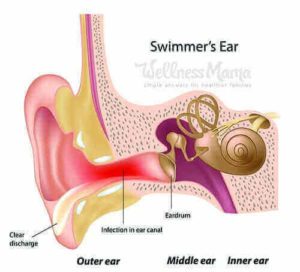Summer means swimming, water fun and time outside. Unfortunately, it also sometimes means the inconveniences attached to these activities. The mosquito bites, bee stings, skinned knees and swimmers ear.
This year, my husband got a painful case of swimmers ear (outer ear infection) that my regular ear infection remedies weren’t able to help, since the ear was so swollen. Some quick research provided some ideas to help remedy this condition and we tested these remedies on my husband. Here’s what worked and what didn’t:
What is Swimmers Ear?
 Swimmers ear (or otitis externa) is an infection of the outer ear that is most often caused due to moisture being trapped in the ear or some kind of damage to the skin of the outer ear, resulting in inflammation and infection. This commonly occurs in swimmers (thus the name) because they spend more time in the water and have more moisture in the ear than most people, but this type of painful infection can occur in anyone.
Swimmers ear (or otitis externa) is an infection of the outer ear that is most often caused due to moisture being trapped in the ear or some kind of damage to the skin of the outer ear, resulting in inflammation and infection. This commonly occurs in swimmers (thus the name) because they spend more time in the water and have more moisture in the ear than most people, but this type of painful infection can occur in anyone.
Apparently, since swimmers ear can be a result of damage to the skin of the outer ear (which allows bacteria or other pathogens to invade the ear), simple things like using cotton swabs or ear phones in the ear can make it susceptible to infection.
Swimmers ear can also be very painful and in my husband’s case, it was severe enough to keep him from sleeping for several nights. Since we were planning to travel a few days after he got the infection, we also consulted with a local urgent care center to see what conventional treatments are for swimmers ear and used a combination of recommendations to finally remedy his infection.
Outer Ear Infection vs Middle Ear Infection
Swimmers ear, also called Otitis Externa, is an infection of the outer ear and is not the same as a middle ear infection, which is more common among children or during a cold or other illness. This type of middle ear infection is also called otitis media and can be very painful.
Outer ear infections can also be painful but in a different way. With swimmers ear, the ear canal itself will often be swollen and extremely painful, so even touching the ear or sticking a finger in the ear can be excruciating. This is often an easy way to determine the type of infection- if sticking a finger in the ear hurts, it is likely an outer ear infection. If the pain is more internal and hurts more when a person swallows, it is more likely a middle ear infection.
A medical professional can help determine for sure what type of infection it is, but these types of ear infections are handled differently.
How to Avoid Swimmers Ear
Benjamin Franklin was famous for (among many things) saying “an ounce of prevention is worth a pound of cure,” and this rings especially true when it comes to swimmers ear.
The nurse practitioner we saw explained that avoiding an outer ear infection is much easier than getting rid of it once it occurs, and that there are simple measures to help reduce the chances of getting this infection. We are now careful to take some of these measures after our children swim this summer to help them avoid infection:
1. Keeping the Ear Dry
Seems like common sense, but since an outer ear infection is often caused my bacteria growing in moisture in the ear, keeping the ear dry is an easy way to help avoid the infection. Simple measures like drying the ear well after swimming and showering can help the ear from becoming infected.
Our nurse practitioner also recommended not trying to remove ear wax, especially with cotton swabs and especially during swimming months, as ear wax can help keep bacteria in the ear at bay.
2. White Vinegar and Alcohol
For the children, our doctor recommends using a mixture of white vinegar and rubbing alcohol after swimming, especially after swimming in lake water, the ocean, or other places that would have an abundance of bacteria that could lead to infection. Her recipe:
- 1/4 cup white vinegar
- 1/4 cup rubbing alcohol
She recommended storing in a dark glass airtight container with a dropper (we used this one) and using this in the ear after swimming each day. My mom did something similar for me as a child, and I’d forgotten about it until she mentioned it. I remember not loving the ear drops as a kid, but I also didn’t get swimmers ear.
Some sources also claim that this can be a helpful way to get rid of swimmers ear once it occurs, but my husband’s ear was so swollen that it didn’t seem to be very effective.
3. Ear Plugs
Another way to help keep the ear dry is by using ear plugs, and this is especially helpful in lake or pond water. After some trial and error, we found that moldable silicon ear plugs (like these) seem to work the best since they can mold to the shape of the ear and are adjustable for adults or children.
Relief for Swimmers Ear
Once my husband had already gotten a bad case of swimmers ear, the measures we could use to avoid the infection weren’t as effective and some stronger remedies were needed. I found that these seemed to help the most:
1. Garlic In Ear
I’ve often used garlic for infections with great results (including for other types of ear infections), and thought it might be helpful for swimmers ear as well. I didn’t want to use my go-to garlic oil, as I was afraid the oil would seal in moisture and make matters worse.
Instead, I used a variation of a poultice on the outer ear overnight and it seemed to offer relief and reduce the infection quite a bit.
What I did:
- Crushed a clove of raw, fresh, organic garlic.
- Placed inside a small piece of sterile gauze.
- Place this on the ear (it wouldn’t really go into the ear at all because it was swollen) and tape with some medical tape to secure.
2. Essential Oils
The nurse practitioner explained that often an outer ear infection will heal on its own, but even with conventional medical treatment, they often recommend measures for pain relief. Since the pain was enough to keep my hubby up at night, I used some essential oils (diluted) around the ear to help with the pain. (Note: I would never use EOs inside the ear as they are very concentrated and could make matters worse!)
What I did:
Mixed 5 drops of lavender essential oil, 2 drops of basil essential oil and 1 drop of peppermint essential oil in 1 tablespoon of olive oil and rubbed on the skin around the ear, behind the ear and on the neck.
3. Hot Packs for Relief
We found that heat was an effective pain relief method and my husband found relief by sleeping with a hot water bottle on his ear.
Why We Saw A Doctor
We were not familiar with outer ear infections and my husband was in a lot of pain and not sleeping, so we did seek medical advice for this. Natural remedies are great and we use them whenever possible, but since my husband was in a good amount of pain and we wanted to make sure there wouldn’t be any long term problems from the infection, we decided it best to seek professional medical advice.
After talking to the nurse practitioner, we learned that mild cases of swimmers ear will often go away on their own, while drops are often given for more severe infections (and for pain relief). She recommended over the counter pain medication to help reduce the pain and swelling and prescribed ear drops as needed.
In the future, we will make sure to follow her advice and use the vinegar/alcohol solution after swimming to avoid any other infections.
Ever had swimmers ear? What did you do to help alleviate it?


Leave a Reply